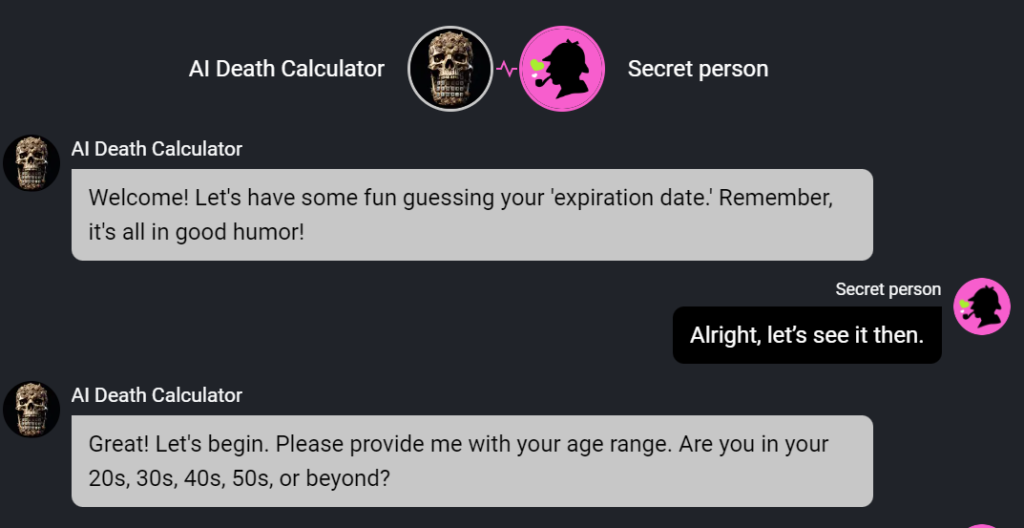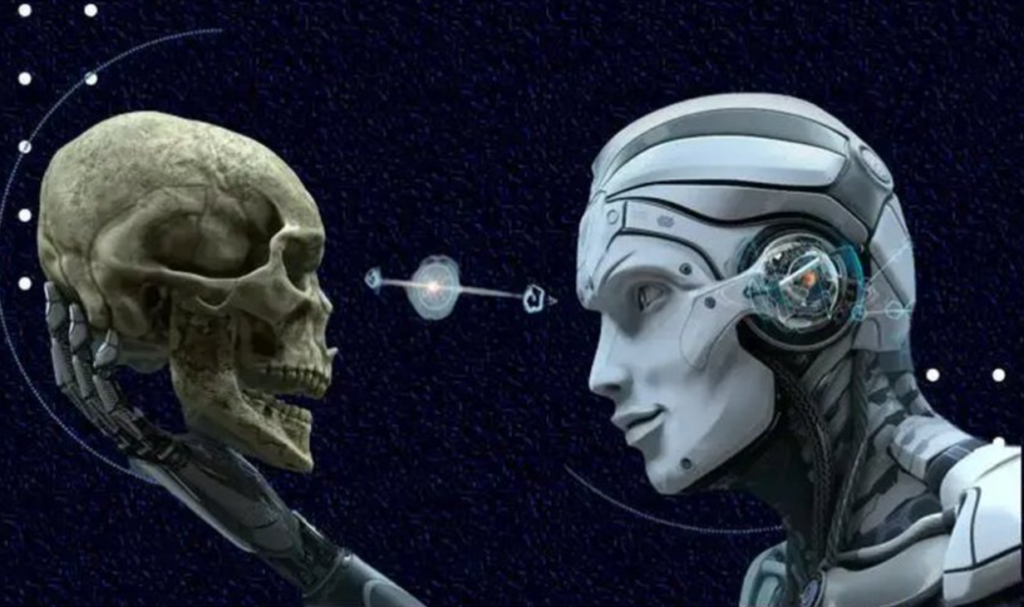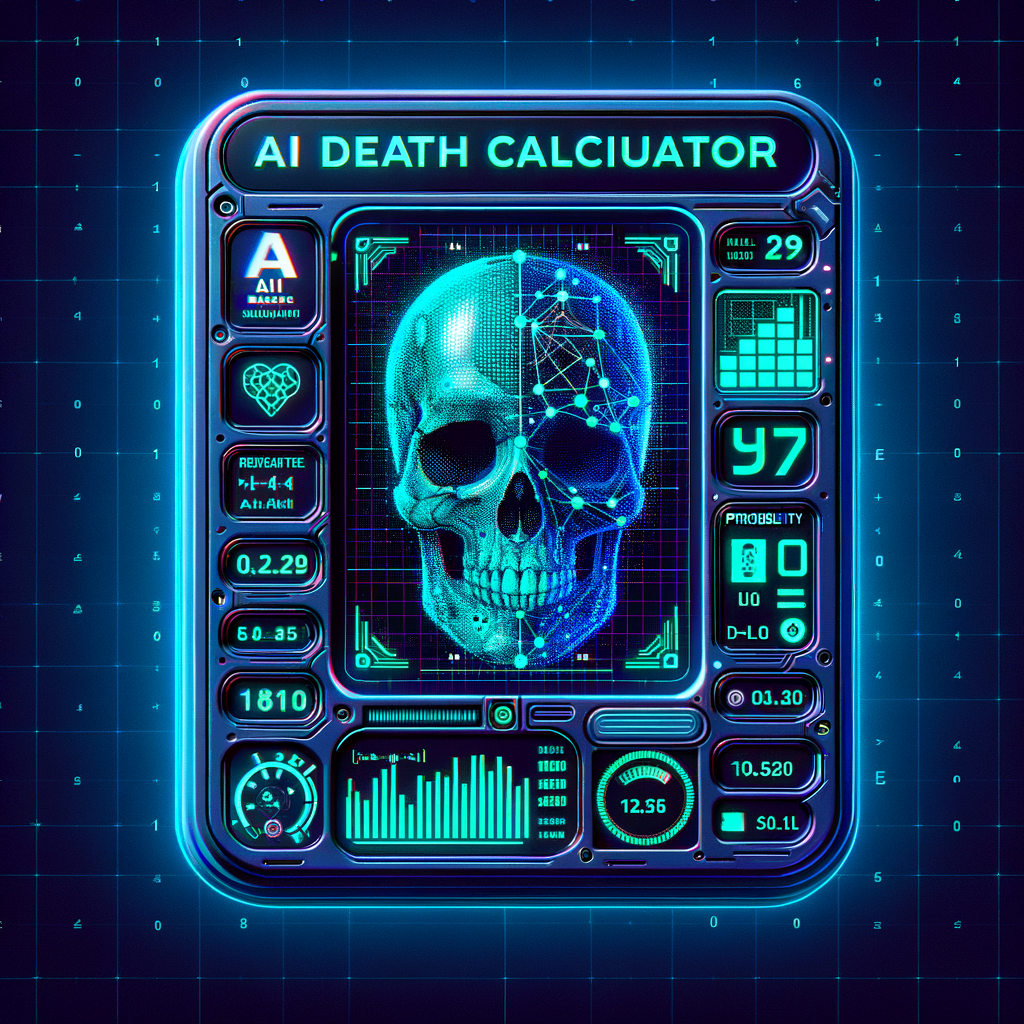Let’s say right away that this is just a service and it cannot make a diagnosis. Consult your doctor if you feel unwell.
AI ‘Death Calculator’ and Its Significance
The AI ‘death calculator’ known as Life2vec has garnered attention for its ability to predict life expectancy using income, profession, and medical records. This innovative use of artificial intelligence in healthcare and longevity research marks a significant advancement in personalized health approaches. However, the introduction of the AI ‘death calculator’ also raises ethical concerns related to death prediction and privacy, bringing forth a complex intersection of technology and mortality.
The potential implications of the AI ‘death calculator’ in disease prevention and life expectancy extension are profound. For instance, it has the potential to revolutionize personal health approaches by providing individuals with insights into factors that might help them live longer and healthier lives. By analyzing human lives using transformer models, the AI ‘death calculator’ takes into account habits like smoking, exercise, and mental health in its predictions, empowering individuals to make informed decisions about their lifestyle and well-being.
Moreover, the ability of the AI ‘death calculator’ to predict personalities, decisions, and even death itself is groundbreaking. This presents a new frontier in healthcare and longevity research, offering the potential for individuals to change their lifestyle and reduce the likelihood of premature death. These advancements underscore the significance of the AI ‘death calculator’ in not only predicting life expectancy but also in shaping personalized approaches to healthcare and well-being.
Overview of AI ‘Death Calculator’
The AI ‘death calculator,’ Life2vec, has been developed to predict life expectancy based on a variety of factors, including income, profession, and medical records. By leveraging transformer models, this chatbot is able to delve into the details of human lives and make predictions with a remarkable 78% accuracy. For example, by analyzing a person’s income, the AI ‘death calculator’ can estimate the individual’s access to healthcare, quality of life, and overall well-being, all of which are crucial factors in determining life expectancy. Similarly, the consideration of profession can shed light on the potential for workplace-related stress, exposure to hazardous environments, or access to preventive healthcare services, all affecting the individual’s lifespan prediction.
Furthermore, the utilization of medical records is significant in that it allows the AI ‘death calculator’ to consider existing health conditions, past medical history, and potential future health risks. For instance, a person with a history of chronic diseases might have a different life expectancy prediction compared to someone with a clean bill of health. This highlights the personalized nature of the predictions made by the AI ‘death calculator’ and underscores the potential impact of AI in individualized healthcare and longevity research. The ability to take into account such personalized data points positions the AI ‘death calculator’ as a groundbreaking tool in providing tailored insights for individuals to make informed decisions about their health and well-being.

How AI Predicts Life Expectancy
The method employed by the AI ‘death calculator’ to analyze human lives using transformer models is a significant aspect of its functionality. This innovative approach allows the AI to process and interpret a vast amount of data related to an individual’s life, including factors such as income, profession, and medical history. For example, the transformer models can analyze and understand complex relationships between these data points to make accurate predictions about life expectancy, taking into account a wide range of variables that can impact an individual’s lifespan.
Moreover, the AI ‘death calculator’ utilizes a unique system of specific information and digital tokens to predict life expectancy, which is comparable to the way languages are processed and understood by AI language models. This advanced method enables the AI to generate personalized life trajectories and make predictions with a remarkable level of accuracy, offering valuable insights into an individual’s potential life expectancy based on their unique circumstances and characteristics. For instance, by leveraging this approach, the AI ‘death calculator’ can provide tailored recommendations for lifestyle modifications, medical interventions, or preventive measures aimed at improving an individual’s longevity.
In addition to processing demographic and medical data, the AI ‘death calculator’ takes into account habits like smoking, exercise, and mental health in its predictions, offering a holistic view of an individual’s health and its impact on life expectancy. This comprehensive analysis enables the AI to provide more nuanced and personalized predictions, allowing individuals to gain a deeper understanding of the factors influencing their longevity and empowering them to make informed decisions about their health and lifestyle choices.
Limitations and Accuracy of AI Death Predictions
The AI ‘death calculator’ known as Life2vec has garnered attention for its remarkable 78% accuracy in predicting life expectancy based on various factors such as income, profession, and medical records. However, it is crucial to recognize the limitations of AI death predictions, even with such a high level of accuracy. Factors like gender, mental health diagnosis, and profession have been identified as contributors to earlier death, shedding light on the complex nature of predicting life expectancy.
For instance, individuals with certain professions may face higher levels of stress, which can impact their health and longevity. Similarly, certain mental health diagnoses may be associated with a greater risk of premature death. These factors highlight the intricacies involved in predicting life expectancy and emphasize the need for a comprehensive understanding of the diverse elements that influence an individual’s lifespan.
Despite the impressive accuracy of the AI ‘death calculator’, ethical considerations have been raised regarding the use of AI in predicting such sensitive outcomes. The potential implications of leveraging AI to predict personalities, decisions, and death are profound, prompting discussions about the privacy and ethical ramifications of accessing such predictive information. As AI continues to advance in its predictive capabilities, it is imperative to carefully consider the ethical implications and societal impact of integrating AI into sensitive areas such as life expectancy prediction.

Ethical Considerations Surrounding AI Death Prediction
The integration of AI in death prediction brings forth ethical concerns regarding consumer access to this information and the potential impact of such predictions on individuals’ lives. There is a growing concern about the ethical implications of using AI to predict life expectancy, especially in terms of consumer access to this sensitive information. The ability to accurately predict life expectancy raises questions about how individuals may react to this knowledge and how it could potentially influence their life choices. For example, individuals may alter their lifestyle, career decisions, or financial planning based on these predictions, which could have significant implications for their overall well-being and mental health.
Moreover, the use of AI in predicting life expectancy and disease prevention presents groundbreaking advancements in healthcare but necessitates careful consideration of privacy and the unknowns of life. The potential revolutionization of personal health approaches through the use of AI in predicting life expectancy emphasizes the need for ethical frameworks and responsible deployment of such technology. As AI algorithms continue to evolve and become more accurate in predicting life events, it becomes crucial to address the ethical implications of this technology. There is a delicate balance between the potential benefits of using AI in healthcare and the ethical considerations surrounding privacy, autonomy, and the human experience. Therefore, as this technology progresses, it is essential to establish ethical guidelines and regulations to ensure that the use of AI in death prediction is conducted in a responsible and transparent manner, prioritizing the well-being and autonomy of individuals.
Use of AI in Healthcare and Longevity Research
The AI ‘death calculator’, known as Life2vec, has the potential to revolutionize personal health approaches through its predictions of life expectancy based on income, profession, and medical records. This innovative use of AI in healthcare and longevity research signifies a groundbreaking advancement, offering individuals the opportunity to gain valuable insights into their potential lifespan and make informed choices about their lifestyle and health decisions. For example, if the AI ‘death calculator’ predicts a shorter life expectancy due to certain habits or characteristics, individuals may be prompted to make positive changes such as quitting smoking, increasing exercise, or seeking mental health support to improve their overall well-being and potentially extend their lifespan.
Furthermore, the AI ‘death calculator’ represents a significant development in the field of disease prevention and life expectancy extension. By analyzing factors such as income, profession, habits, and medical history, the AI provides a comprehensive assessment of an individual’s potential lifespan, thereby empowering individuals to take proactive measures in maintaining their health and well-being. This proactive approach to healthcare and longevity research highlights the potential for AI to not only predict life expectancy but to also serve as a catalyst for positive behavioral changes and personalized health interventions. The use of AI in this capacity opens the door to a future where individuals can leverage predictive technology to optimize their health outcomes and make informed decisions that may lead to longer, healthier lives.


Leave a Reply
You must be logged in to post a comment.